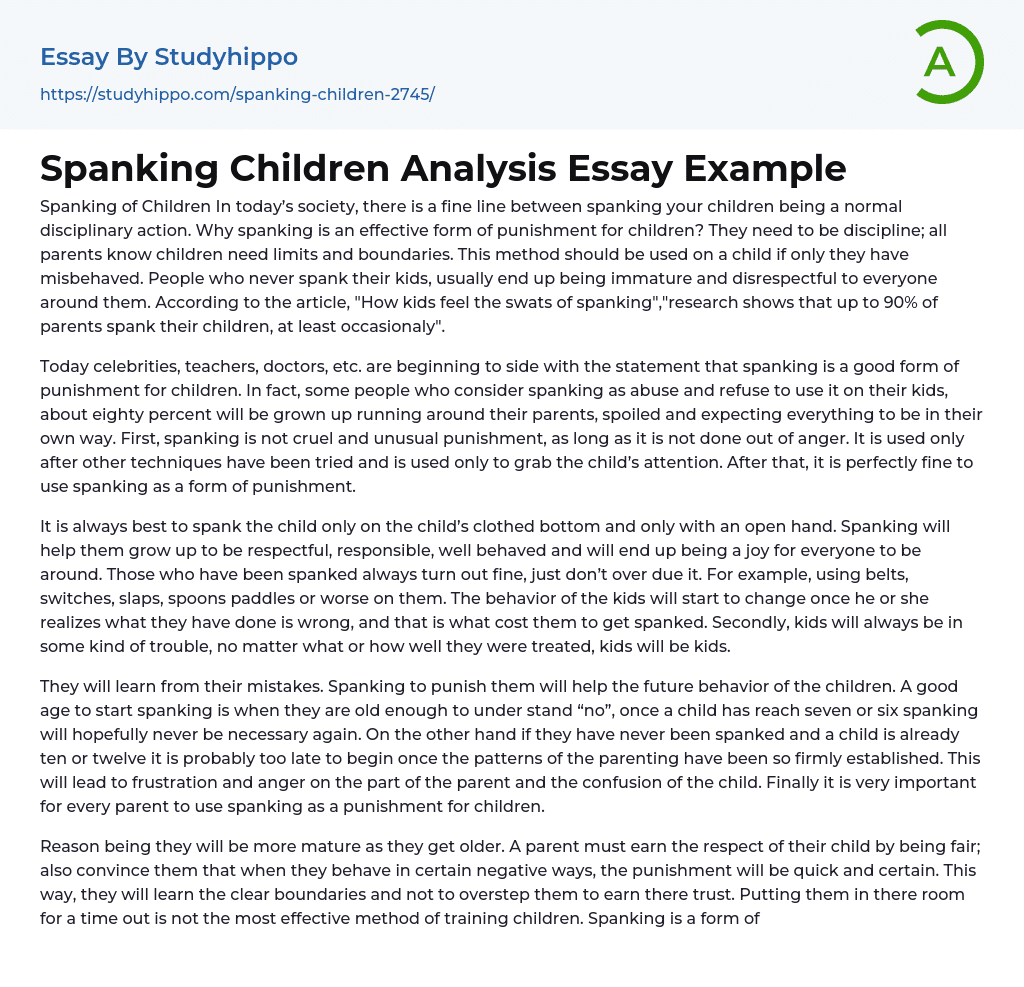The use of spanking as a disciplinary action for children is both widely accepted and controversial in today's society. While some view spanking as an effective method to enforce discipline and set boundaries, it should only be used when a child misbehaves. Parents who opt not to spank often observe disrespectful behavior and immaturity in their children. According to the study "How kids feel the swats of spanking," about 90% of parents occasionally resort to spanking their children.
There is a growing endorsement in today's society for the effectiveness of spanking as a means of disciplining children. This support comes from various figures including celebrities, teachers, and doctors. While some people may view spanking as abusive and choose not to use it with their own kids, approximately eighty percent of these children are likely to grow up without proper
...discipline and develop a sense of entitlement. They may expect things to always go their way. It is important to emphasize that spanking is not considered cruel or unusual punishment if it is done without anger. It should only be used as a last resort after exhausting all other disciplinary methods, with the primary objective being to get the child's attention. Therefore, utilizing spanking as a disciplinary measure is completely acceptable.
It is recommended to administer a spank to a child's clothed bottom using only an open hand. This disciplinary action promotes respect, responsibility, and good behavior, resulting in a pleasant atmosphere for everyone. However, it is crucial to avoid excessive force or the use of harmful objects like belts, switches, slaps, spoons, or paddles. The child's behavior will start to improve once they understand the consequences of
their wrongdoing and realize why they received a spanking. Additionally, it should be acknowledged that children will inevitably find themselves in trouble regardless of their upbringing or treatment, as it is part of their nature.
Using spanking as a means of discipline can effectively improve children's future behavior by teaching them from their mistakes. It is recommended to initiate spanking when children reach an age where they can comprehend the concept of "no". Typically, by the age of seven or six, if proper disciplinary actions have been taken through spanking, it is expected that further instances will not be required. However, for children who have never experienced spanking and are already ten or twelve years old, introducing this form of discipline may become ineffective as parenting patterns would have already been deeply ingrained. This situation could lead to frustration and anger for parents and confusion for the child. Ultimately, it is imperative for every parent to carefully consider implementing spanking as a punishment method for their children.
As children grow older, they develop more maturity, so parents should make an effort to earn their respect by being fair and convincing them that engaging in negative behavior will lead to immediate and definite consequences. This approach helps children comprehend clear boundaries and avoid crossing them, ultimately fostering trust. Instead of confining them to a room for a time out, it is not the most effective method for training children. Spanking is a form of punishment that applies universally to all children. In situations like being at a restaurant or store, it is preferable to relocate them to a neutral area with only a few observers present, such as
outside or to a corner.
It is crucial to never embarrass a child in front of siblings or others as it not only captures their attention but also aids in improving their future behavior. Instead of resorting to spanking when angry, parents should suggest taking time to reflect on the situation and calm down before reevaluating. Although some view spanking as mistreatment, they secretly recognize its suitability. Parents must enforce it; otherwise, the child will persist in engaging in inappropriate behavior without comprehending right from wrong.
- Child essays
- Childcare essays
- Child labor essays
- Doll essays
- Mass Incarceration essays
- Adoption essays
- Aunt essays
- Babies essays
- Bedroom essays
- Caring essays
- Children essays
- Daughter essays
- Divorce essays
- Dog essays
- Dysfunctional Family essays
- Family Tradition essays
- Family Values essays
- Father essays
- Foster Care essays
- Friends essays
- Grandparent essays
- Home essays
- Hometown essays
- Husband essays
- Jealousy essays
- Love essays
- Marriage essays
- Mother essays
- Online Dating essays
- Parenting essays
- Parenting Teens essays
- Parents essays
- Relationship essays
- Room essays
- Sibling essays
- Sister essays
- Wedding essays
- Wife essays
- American Dream essays
- Barriers To Entry essays
- Capitalism essays
- Central Bank essays
- Compensation essays
- Consumerism essays
- Economic Development essays
- Economic Growth essays
- Economic Inequality essays
- Economic System essays
- Economy essays
- Employment essays




